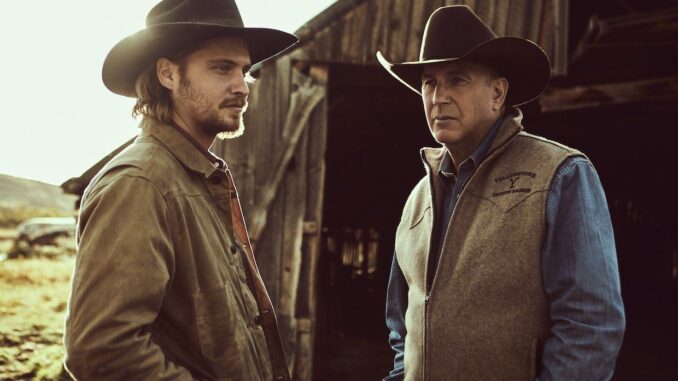
The digital plains of streaming services stretch vast and competitive, a new Wild West where content is gold and subscriber loyalty the most coveted claim. In this evolving landscape, a conflict has erupted, not with bullets and horses, but with intellectual property and exclusive rights. At the heart of this modern-day skirmish lies “Yellowstone,” the reigning king of contemporary Western dramas, and its burgeoning empire of spin-offs. The combatants: Paramount, the rightful owner of the Yellowstone universe, and NBCUniversal, a media titan holding a peculiar, powerful piece of the original series.
For those unfamiliar with the rugged, sprawling dramas of the Dutton family, “Yellowstone” is more than just a television show; it’s a cultural phenomenon. It has resonated deeply with a demographic often overlooked by coastal media, capturing the essence of American heartland values, family feuds, and the raw struggle for land and legacy. Its success transformed it into a golden goose, laying not just episodes, but entire new sagas. When Paramount Global, the parent company, saw the unprecedented adoration for the show, it wisely decided to expand the universe, greenlighting prequels like “1883” and “1923,” and future spin-offs like “6666.” These new frontiers, however, became the flashpoints in the streaming war.
The peculiar twist in this tale of ownership lies in a legacy deal. Before Paramount+ was fully conceived as the studio’s flagship streaming service, before the full magnitude of “Yellowstone’s” cultural impact was understood, the streaming rights to the original series were licensed to NBCUniversal’s fledgling platform, Peacock. It was a tactical move at the time, a way to monetize content while Paramount was still building its own streaming infrastructure. But as “Yellowstone” soared, becoming the most-watched cable show and a bedrock of Peacock’s catalog, Paramount found itself in a peculiar bind: the crown jewel of its content library was luring subscribers to a rival.
This historical licensing agreement set the stage for the current war. Paramount, realizing the strategic misstep of ceding its most valuable asset, declared its intentions clearly: while the original “Yellowstone” would remain on Peacock, all new spin-offs, prequels, and sequels – the entire expanding Duttonverse – would be exclusive to Paramount+. It was a bold counter-move, an attempt to use the very momentum of the franchise to draw viewers to its own platform. “1883,” a gritty, critically acclaimed prequel following the Dutton ancestors, became the first major salvo, beckoning fans of the original to subscribe to Paramount+ to continue their journey through the family’s history. Then came “1923,” starring Harrison Ford and Helen Mirren, further entrenching the new content on Paramount+.
NBCUniversal, holding the original “Yellowstone” but locked out of its thriving extensions, found itself in an unenviable position. They have a proven draw, a magnet for viewers, but it’s a magnet that points directly to a competitor’s deeper well of related content. Their strategy became one of robust marketing for the existing seasons, reminding audiences that the show that started it all still lives on Peacock. Yet, the fragmentation is undeniable, a constant irritant for both the companies vying for attention and the viewers caught in the crossfire.
For the audience, this corporate skirmish translates into a fragmented mosaic of entertainment. To fully immerse oneself in the Duttonverse, one must navigate between two distinct streaming services. The original series resides in one digital corral, while its critically acclaimed prequels and future offshoots demand a separate subscription. This isn’t just an inconvenience; it’s a symptom of the broader “streaming war” where every major media company is desperate to carve out its own walled garden of exclusive content. The promise of cord-cutting, once hailed as a liberation from bloated cable packages, now risks morphing into a new form of subscription fatigue, where a handful of must-watch shows necessitate a dizzying array of monthly fees.
The “Yellowstone” streaming war between Paramount and NBCUniversal is more than a squabble over a popular show. It’s an illustrative battleground demonstrating the titanic stakes of intellectual property in the digital age. It highlights the shifting power dynamics, the consequences of past licensing deals, and the relentless pursuit of subscriber acquisition. As the streaming landscape continues to evolve, these skirmishes over beloved franchises will only intensify, forcing both companies and consumers to adapt to an increasingly complex and competitive future where the battle for our attention is fought one exclusive series at a time. The dust may not settle on the digital plains anytime soon, and the ultimate victor will be determined by who can best wrangle the loyalties of the modern viewer.
